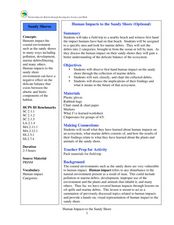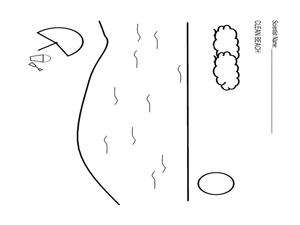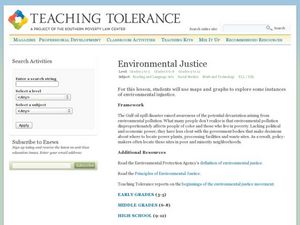Curated OER
Water Pollution Graphing Activity
Students describe and identify the link between land use activities within a watershed and water quality. They evaluate the quality of a "water sample" ( a bag of skittles), graph their results, and form a hypothesis about the land use...
Curated OER
Environmental Problems and Solutions
In this environmental problems and solutions worksheet, learners are given a list of 25 environmental problems. They match them with a given solution and paste the matching pairs to a piece of construction paper.
Curated OER
Human Impacts to the Sandy Shore
Students investigate human impact on coastal environments. In this coastal environment lesson, students observe human impact on coastal environments. Students sort, classify, and chart marine debris collected on a local beach.
Curated OER
Fish Hazards
Students study the Pacific salmon and see the different challenges they face. In this environment lesson students complete several activities that show how humans have affected the salmon environment. These activities have varying...
Curated OER
Isn't It Ionic?
Students research the properties and health risks of organic chemical solvents. They create a Safety with Solvents newsletter to share with others in their school and community.
What affects Frog metamorphosis?
In this lab, students explore pollutants which affect frog metamorphosis using household pollutants (vinegar, oil, and bleach) and sponge capsules.
Florida Department of Environmental Protection
Build Your Own Aquifer
Ever wondered how an aquifer works? Introduce your class to the amazing way many people get water by exploring how underground aquifers work. Two fun hands-on activities are used to help kids understand what an aquifer is, how it works,...
Curated OER
Digital Video Lesson Plan: Brine Shrimp
Students participate in classroom experiment to gain better understanding of type of environment brine shrimp can best survive. Students then explore effects of common saltwater pollutants on survival of animals in sea.
Pulitzer Center
Extractive Industries
Here is a chance for environmental studies classes to take a critical look at crises occurring around the globe by reading articles and viewing video clips. The human activities under scrutiny are the extraction of oil, logging, and...
Royal Society of Chemistry
Esters from Alcohols and Acids
Fats and oils often contain esters, which sometimes find their way into perfumes due to their pleasant smells. Scholars match the name of esters made from four different types of alcohol and four different types of carboxylic acids....
Kenan Fellows
Sustainability: Learning for a Lifetime – The Importance of Water
Water is essential for life—and understanding the importance of clean drinking water is essential in understanding sustainability! Show your environmental science class the basics of water testing and treatment through a week-long...
Curated OER
Oily Oceans
Students are read a book about oceans. They participate in an experiment discovering the effects of oil on water. They discuss different types of pollution and how they can be prevented.
Curated OER
Don't Trust Your Eyes
Students brainstorm a list of possible actions that they could do to protect the water resources from pollution. They create hypotheses and conclusions by completing experiments and observing different pollutants.
Curated OER
You are the Microbiologist
In this lesson, young scholars demonstrate comprehension of basic lab techniques by properly using these techniques in preparing a laboratory investigation, demonstrate synthesis of prior lab experiences by solving a new problem using...
Curated OER
What Are We?
Pupils describe different types of water pollutants. They complete experiments in which they observe the affects of water pollution on algae. They also brainstorm and list three causes of each water pollutant.
Curated OER
How Green Are We?
Learners identify and interpret the importance of energy efficiency in connection with air pollution. They communicate with families and peers about ways to more effectively contribute to the reduction of air pollution. Finally,...
Curated OER
Particulate Matter: How Dirty is the Air We Breathe?
Fourth graders create a simple testing device and collect and observe the pollution in the air we breathe.
Curated OER
Particulate Matter: How Dirty is the Air We Breathe?
Fourth graders work together to collect air samples for testing. They determine the amount of pollution in the air in their community. They discuss their results to end the lesson.
Curated OER
Subsurface Contamination of Groundwater
Students evaluate the potential problems associated with underground storage tanks. They research the potential hazards from various subsurface pollutants and simulate a superfund site cleanup.
Curated OER
CO Buildup City
High schoolers conduct a controlled experiment. They collect data in an organized manner. Students analyze data to reach a conclusion and communicate findings. They explain how city size, temperature, and pollution is related to the air...
Curated OER
Let's Catch Some Dirt From the Air
Students create "catchers" that collect dirt particles from the air. They observe the particulate matter that is collected from the air and discuss the effects and causes of air pollution.
Curated OER
Environmental Justice
Students explore the concept of environmental stewardship. In this Gulf Oil Spill lesson, students discuss how environmental pollution affects those how live in poverty at a higher rate than those with more affluence. Students read...
Curated OER
Caution: Fix It!
Students explore the concept of environmental stewardship. In this science lesson, students investigate events that have harmed coastal resources and how human activity has restored coastal resources.
Curated OER
Breaking News English: World Naked Bike Ride Against Oil Use
In this English worksheet, learners read "World Naked Bike Ride Against Oil Use," and then respond to 47 fill in the blank, 7 short answer, 20 matching, and 8 true or false questions about the selection.
Other popular searches
- Water Pollution Oil Spills
- Oil Pollution and Plants
- Oil Pollution Venezuela
- Oil Pollution in Venezuela
- Oil Pollution Experiments
- Oil Pollution Act























